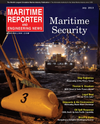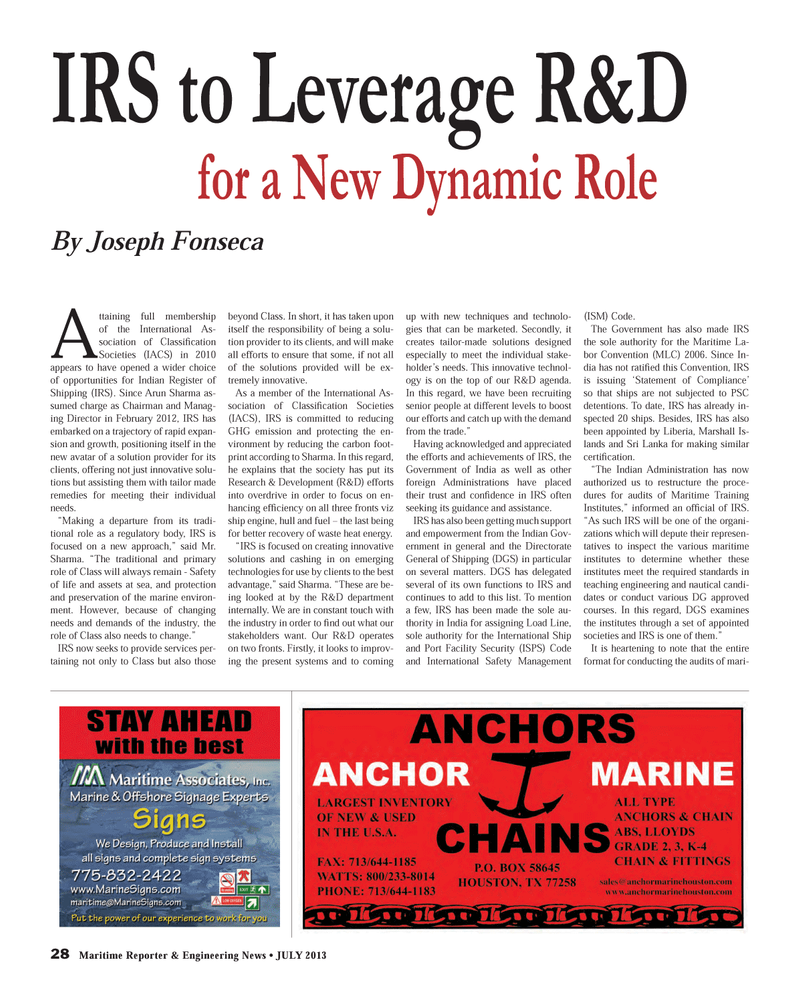
Page 28: of Maritime Reporter Magazine (July 2013)
Maritime Security Edition
Read this page in Pdf, Flash or Html5 edition of July 2013 Maritime Reporter Magazine
28 Maritime Reporter & Engineering News ? JULY 2013 IRS to Leverage R&D for a New Dynamic Role By Joseph FonsecaAttaining full membership of the International As- sociation of ClassiÞ cation Societies (IACS) in 2010 appears to have opened a wider choice of opportunities for Indian Register of Shipping (IRS). Since Arun Sharma as- sumed charge as Chairman and Manag- ing Director in February 2012, IRS has embarked on a trajectory of rapid expan-sion and growth, positioning itself in the new avatar of a solution provider for its clients, offering not just innovative solu- tions but assisting them with tailor made remedies for meeting their individual needs.?Making a departure from its tradi-tional role as a regulatory body, IRS is focused on a new approach,? said Mr. Sharma. ?The traditional and primary role of Class will always remain - Safety of life and assets at sea, and protection and preservation of the marine environ-ment. However, because of changing needs and demands of the industry, the role of Class also needs to change.?IRS now seeks to provide services per- taining not only to Class but also those beyond Class. In short, it has taken upon itself the responsibility of being a solu-tion provider to its clients, and will make all efforts to ensure that some, if not all of the solutions provided will be ex-tremely innovative.As a member of the International As- sociation of ClassiÞ cation Societies (IACS), IRS is committed to reducing GHG emission and protecting the en-vironment by reducing the carbon foot-print according to Sharma. In this regard, he explains that the society has put its Research & Development (R&D) efforts into overdrive in order to focus on en-hancing efÞ ciency on all three fronts viz ship engine, hull and fuel ? the last being for better recovery of waste heat energy. ?IRS is focused on creating innovative solutions and cashing in on emerging technologies for use by clients to the best advantage,? said Sharma. ?These are be-ing looked at by the R&D department internally. We are in constant touch with the industry in order to Þ nd out what our stakeholders want. Our R&D operates on two fronts. Firstly, it looks to improv- ing the present systems and to coming up with new techniques and technolo-gies that can be marketed. Secondly, it creates tailor-made solutions designed especially to meet the individual stake-holder?s needs. This innovative technol- ogy is on the top of our R&D agenda. In this regard, we have been recruiting senior people at different levels to boost our efforts and catch up with the demand from the trade.?Having acknowledged and appreciated the efforts and achievements of IRS, the Government of India as well as other foreign Administrations have placed their trust and conÞ dence in IRS often seeking its guidance and assistance. IRS has also been getting much support and empowerment from the Indian Gov-ernment in general and the Directorate General of Shipping (DGS) in particular on several matters. DGS has delegated several of its own functions to IRS and continues to add to this list. To mention a few, IRS has been made the sole au- thority in India for assigning Load Line, sole authority for the International Ship and Port Facility Security (ISPS) Code and International Safety Management (ISM) Code. The Government has also made IRS the sole authority for the Maritime La-bor Convention (MLC) 2006. Since In-dia has not ratiÞ ed this Convention, IRS is issuing ?Statement of Compliance? so that ships are not subjected to PSC detentions. To date, IRS has already in- spected 20 ships. Besides, IRS has also been appointed by Liberia, Marshall Is-lands and Sri Lanka for making similar certiÞ cation.?The Indian Administration has now authorized us to restructure the proce-dures for audits of Maritime Training Institutes,? informed an ofÞ cial of IRS. ?As such IRS will be one of the organi- zations which will depute their represen-tatives to inspect the various maritime institutes to determine whether these institutes meet the required standards in teaching engineering and nautical candi-dates or conduct various DG approved courses. In this regard, DGS examines the institutes through a set of appointed societies and IRS is one of them.?It is heartening to note that the entire format for conducting the audits of mari-MR #7 (26-33).indd 28MR #7 (26-33).indd 287/1/2013 9:18:41 AM7/1/2013 9:18:41 AM

 27
27

 29
29
